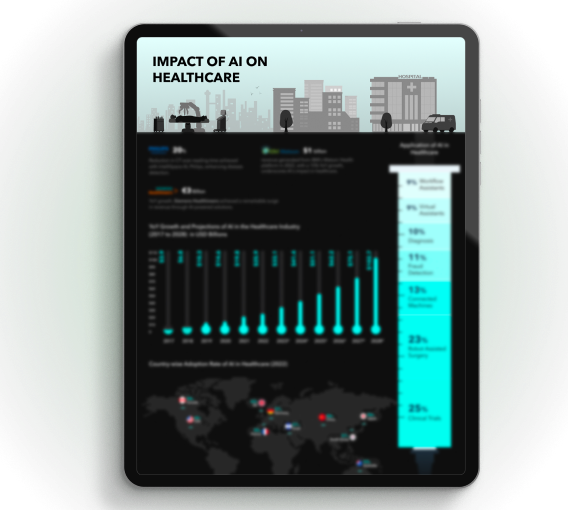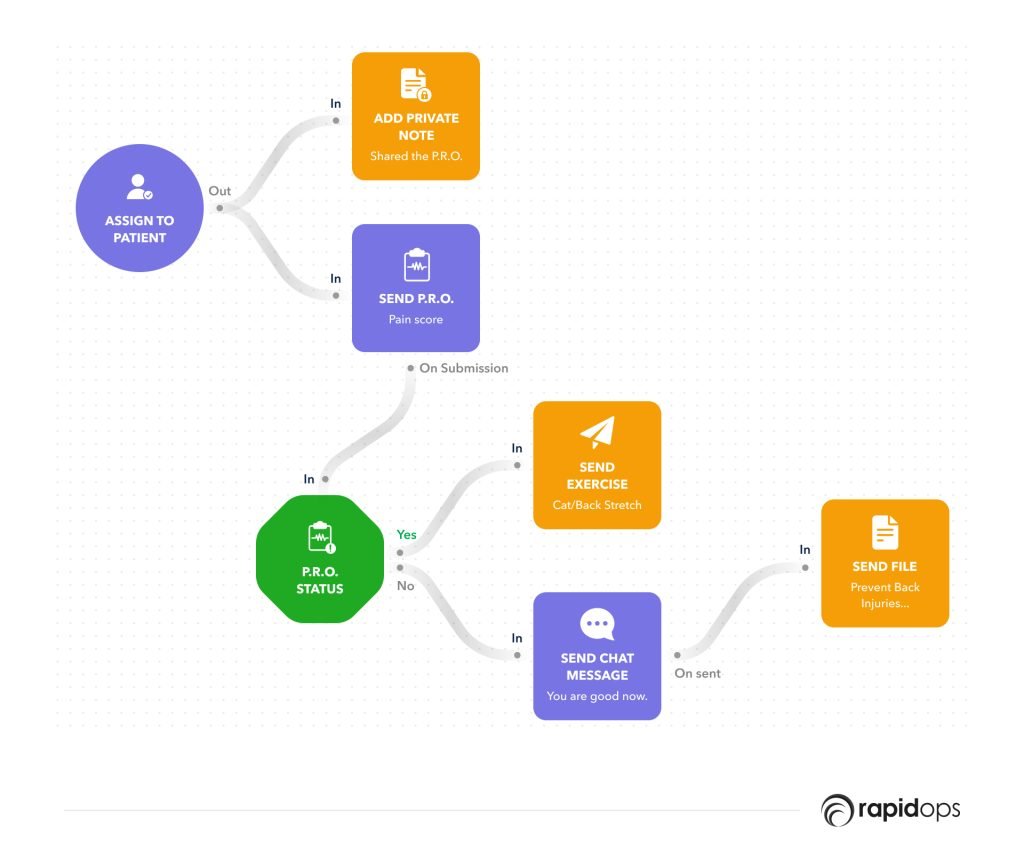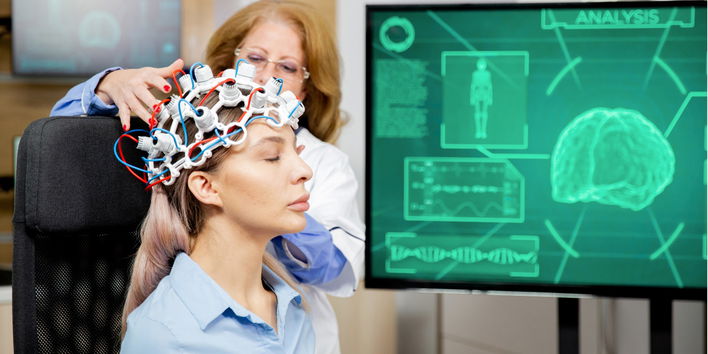We have been covering the impact of artificial intelligence in various business industry processes and segments. This article aims to help the readers understand the reasons behind the adoption of artificial intelligence in healthcare.
Why should you care about the eminence of artificial intelligence in healthcare?
Roughly 400,000 hospitalized patients suffer preventable harm, with 100,000 deaths. Considering that, the promise of improving the diagnostic process is one of AI’s most exciting healthcare applications. – PubMed
Artificial intelligence (AI) has gained considerable prominence in the modern business scenario. AI is a disruptive force that will help healthcare leaders create a path toward efficient and scalable processes.
Okay, understood, but is AI that relevant for me?
AI has the potential to be a transformative force that opens new avenues of profitability and growth. But when we say AI, we mean AI and all of its related technologies.
The healthcare industry must bring disparate data points, resources, and technologies to disrupt and scale its business. Industry leaders in the healthcare segment are already leveraging AI to deploy the most meticulous patient care.
Whether diagnosing chronic diseases, performing radiology, or doing risk assessment, AI has helped create countless opportunities in the healthcare industry.
Check our infographic to know how AI is revolutionizing the healthcare industry!
Download Now
Adoption of AI in healthcare is advancing medical treatment and patient experiences
The healthcare industry must be disrupted.
Yes! Patients expect better healthcare service. Why? Well, due to
- an aging population
- rise of chronic diseases
- ever-growing cost of care
- risk of providing sustainable patient care
To meet these challenges, the healthcare industry must change how it works. From how using AI in healthcare for patient interaction to making that interaction efficient.
The adoption of AI will be essential to enable these changes. AI has already begun to impact every aspect of healthcare, from diagnosis and treatment to insurance and patient behavior.
As AI solutions become more sophisticated, they will touch every part of the healthcare ecosystem. They will be integrated in wearables that detect early signs of disease to chatbots that help patients with self-care.
In the clinical setting, AI is used to help with diagnosis, treatment, and predictions about the course of a disease.
In 2018, Google's DeepMind Health AI team announced that it had developed an algorithm that could detect more than 50 types of eye diseases as accurately as a panel of eight expert clinicians.
The algorithm was trained on nearly 280,000 anonymized eye scans and had the potential to speed up diagnosis and treatment for a range of conditions, including -
- Age-related macular degeneration
- Diabetic retinopathy
- Glaucoma
Here are some of the crucial segments that gain better efficiency with the implementation of artificial intelligence in healthcare
1. Radiology
A recent study comparing the performance of a deep learning algorithm with that of human experts found that the AI system could detect breast cancer with greater accuracy, sensitivity, and specificity.
2. Cardiology
Zio, an AI system by iRhythm Technologies, was able to accurately identify arrhythmias in electrocardiogram (ECG) readings with a similar level of accuracy as highly trained specialists.
The AI system identified atrial fibrillation, a condition associated with an increased risk of stroke, more accurately than human experts.
3. Oncology
IBM Watson for Oncology is being used at Memorial Sloan Kettering Cancer Center in New York to help doctors make treatment recommendations for individual cancer patients.
The system analyzes a patient's medical history, symptoms, lab test results, and the latest evidence from cancer literature to generate a list of treatment options.
4. Faster medical drug manufacturing
AI is also being used to develop new drugs and bring them to market faster. Exscientia, a UK-based startup, developed Edison, an artificial intelligence-based software for designing minor molecule drug candidates ten times faster and at a fraction of the cost of traditional methods.
The AI system designs molecules by sifting through data to identify those with the desired medicinal properties. So far, Edison has been used to design clinical candidates for several therapeutic areas, including
- pain
- oncology
- cardiovascular disease
5. Streamline insurance process
US-based startup Oscar Health is using artificial intelligence to automate the payment of insurance claims.
The company's AI system, Oscar Concierge, uses a combination of machine learning and natural language processing to read and understand medical documents such as doctor's notes, lab reports, and prescriptions.
It then verifies the information against the patient's health plan and automatically pays the provider ‒ all within 48 hours.
6. Improve patient engagement and customer service
AI is an excellent instrument for improving healthcare patient engagement and customer service. US-based startup Kyruus uses artificial intelligence to match patients with the right providers based on their specific needs.
The company's ProviderMatch platform combines clinical data with artificial intelligence algorithms to create a searchable database of providers.
Patients can search for providers based on
- location
- insurance plans accepted
- languages spoken
- clinical expertise
Concluding thoughts: Automate your patient care processes with AI in healthcare
Artificial intelligence has the capability of a computer program to perform tasks or reasoning processes that we usually associate with intelligence in a human being.
Besides boosting staff morale and retention, artificial intelligence and machine learning algorithms can revolutionize patient care and make healthcare delivery more efficient.
Its ability to automate tasks also helps clinicians to provide better care and more time to patients, which helps increase the development of life-saving therapies. With technological growth, consumer behavior data and advanced AI analytics will keep making progress. This progress will help the healthcare industry deliver automated and personalized patient care.

AI has the potential to change healthcare for the better, and it is already helping address some critical healthcare issues.
If you choose Rapidops as a digitalization partner, we can -
- Help devise a strategy for streamlining medical data records
- Choose the relevant technology and talent
- Merge AI/ML algorithms
- Develop an end-to-end healthcare infrastructure
We have the expertise and experience to create digitally advanced processes that will help you stay relevant in this digitally disruptive market.

Saptarshi Das
Content Editor
9+ years of expertise in content marketing, SEO, and SERP research. Creates informative, engaging content to achieve marketing goals. Empathetic approach and deep understanding of target audience needs. Expert in SEO optimization for maximum visibility. Your ideal content marketing strategist.

Let’s build the next big thing!
Share your ideas and vision with us to explore your digital opportunities
Similar Stories
- AI
- 4 Mins
- September 2022

- AI
- 7 Mins
- April 2023


Receive articles like this in your mailbox
Sign up to get weekly insights & inspiration in your inbox.

